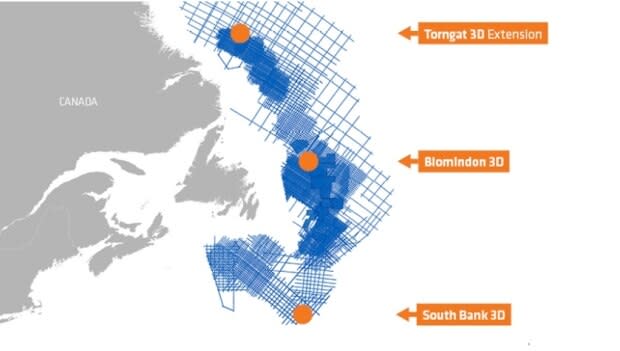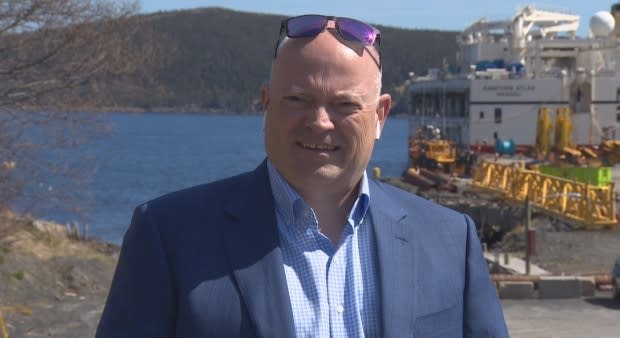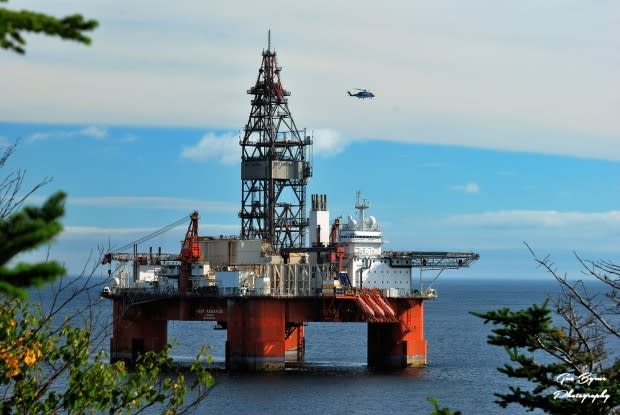Plan to double N.L. oil sector by 2030 'extremely jeopardized,' says OilCo executive
A top oil executive in Newfoundland and Labrador says a crisis sweeping over the industry has likely dealt a crippling blow to an ambitious plan to double production in the province by the end of this decade.
Jim Keating, acting CEO of Crown-owned OilCo, the province's new stand-alone oil and gas corporation shaved off from Nalcor Energy, said the pandemic-fuelled shutdown of the oil industry has thrown that ramp-up into doubt.
"I'd say that plan is extremely jeopardized," Jim Keating told CBC News.
He made the comment this week during an interview in Bay Bulls, in the shadow of a unique ship called the Ramform Atlas, one of two vessels that will carry out three costly seismic surveys in the offshore this summer.
The surveys represent an investment of about $100 million, with about a quarter of that money coming from government-owned OilCo, and the remainder from oil companies.

Seismic activity enables oil companies to get a close look at the geology beneath the seabed, and that data will help make a business case for whether companies will make a bid on land parcels and commit to further exploration.
Results from past seismic work helped initiate a flurry of interest, with companies pledging to spend some $4 billion in exploration campaigns over the next few years. Eight companies have submitted plans to drill 100 exploration wells this decade.
But that investment is now in limbo, said Keating.
"We've got now potentially $4 billion worth of work commitments either stranded or indefinitely deferred," he said.
It's Keating's job to shepherd the Advance 2030 strategy into reality for the province by setting the groundwork for an unprecedented exploration campaign and the possible development of a natural gas industry.
Earlier this year, that plan appeared to be on track, and Keating was referring to a "bow wave" of activity, raising hopes that drilling in the offshore would result in discoveries similar to those that precipitated development of the Hibernia, Hebron, White Rose and Terra Nova oil fields.

But oil prices have cratered, along with the worldwide demand for transportation fuels, because of the COVID-19 pandemic and a production war between oil giants Saudi Arabia and Russia.
That's pushed the oil industry, which has routinely contributed 30 per cent of the value of goods produced in the province, into crisis mode.
Despite calls for a shift away from oil and gas by those concerned about climate change, the provincial government has unapologetically charged hard in favour of increased production, arguing that offshore oil has some of the lowest carbon emissions in the world.
"It's part of the solution as we transition from a carbon to a non-carbon economy," said Keating.
Critics who say seismic activity damages sea life are not supported by any facts, said Keating.
"We're happy and we're confident that there's been, yet to date, no correlation between the seismic work that these vessels do in any kind of loss in opportunity in fish stocks."
Companies have put the brakes on capital spending, chopping budgets by 20 to 30 per cent. The fact seismic work continues is a positive sign in a sea of negativity and concern, said Keating.
"It's testament to the fact that the industry still believes we have a tremendous geologic potential in our offshore."
Meanwhile, there's plenty of evidence of this purse-tightening in Newfoundland and Labrador, including a decision by Equinor to park a plan to develop its $6.8-billion Bay du Nord project, the suspension of drilling activity on the Hibernia platform and deferral of important subsea developments, and what could be a two-year shutdown of the Terra Nova FPSO.
Chinese company CNOOC International has also delayed an exploration campaign in the Flemish Pass, and Husky Energy and its partners have halted construction of the White White Rose wellhead platform.
The oil industry and its supporters have responded by calling on Ottawa to develop an incentive plan to encourage companies to continue investing in the offshore, but after weeks of lobbying, the federal government has not yet offered a lifeline.
People like Keating are quick to remind Ottawa that all four producing fields in the offshore were discovered in the 1970s and '80s, at a time when Ottawa was offering exploration incentives.
Keating said every dollar spent on investment leads to $13 in value from the sale of oil, with a good chunk of that going back to provincial and federal governments in the form of taxes and royalties.
Meanwhile, the presence of the Ramform Atlas in Bay Bulls is proof that all hope is not lost for the industry.
The Atlas, and her sister ship, the Ramform Titan, will carry out three 3D seismic surveys in areas known as Blomidon, South Bank, and Torngat Extension, covering about 10,000 square kilometres of seabed.

Still, Keating said, the industry is "very precarious," worldwide competition for scarce investment capital is fierce, and incentives in places like Norway could lure business away from Newfoundland and Labrador.
"There is some sense to making these investments now, because oil companies are still looking for opportunities and we believe we still have them here," said Keating.
"But the industry is notorious for having long cycles. If we're caught on the wrong side and miss that window of investment, or it goes somewhere else, it might not come back at all."
Read more from CBC Newfoundland and Labrador


